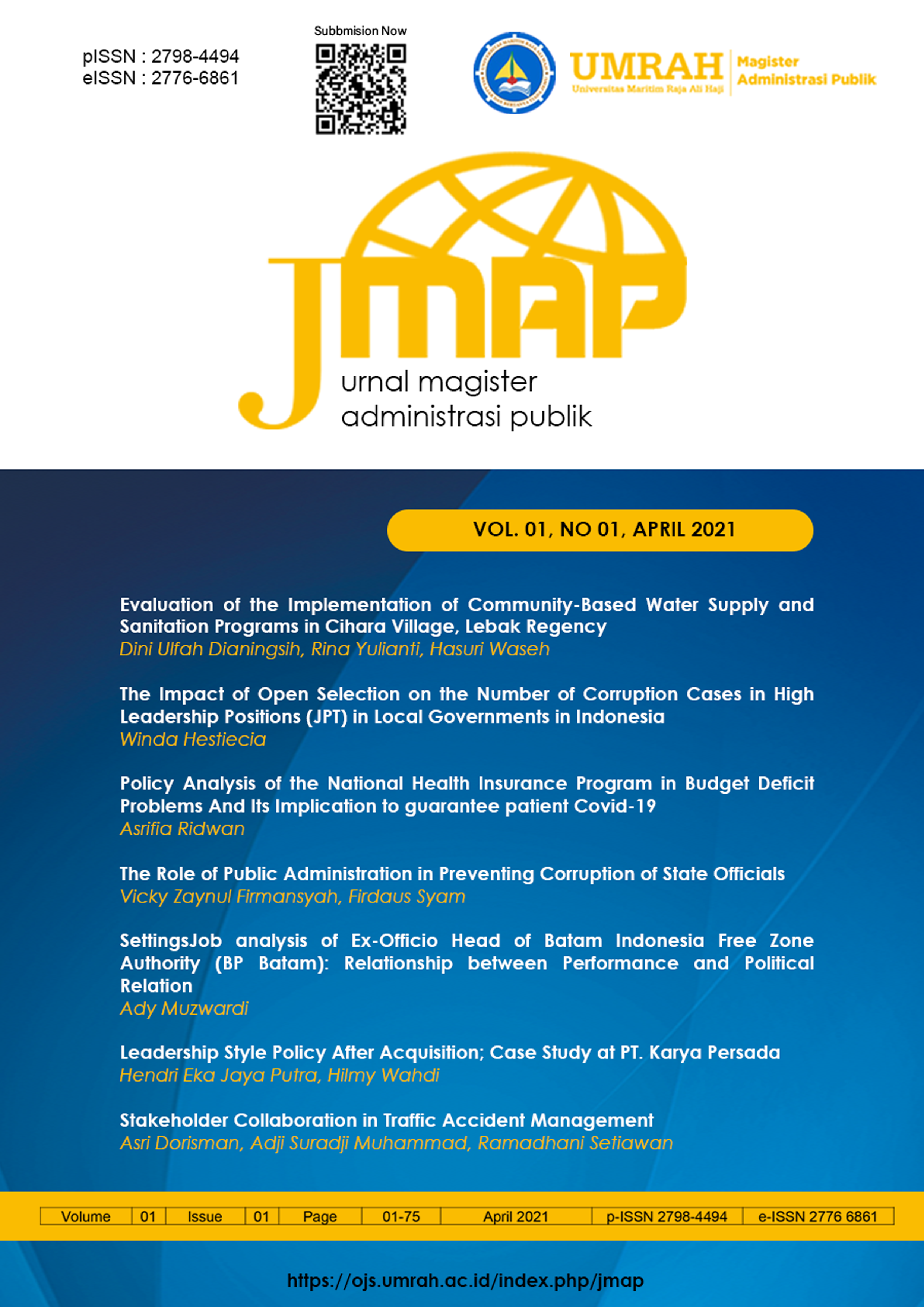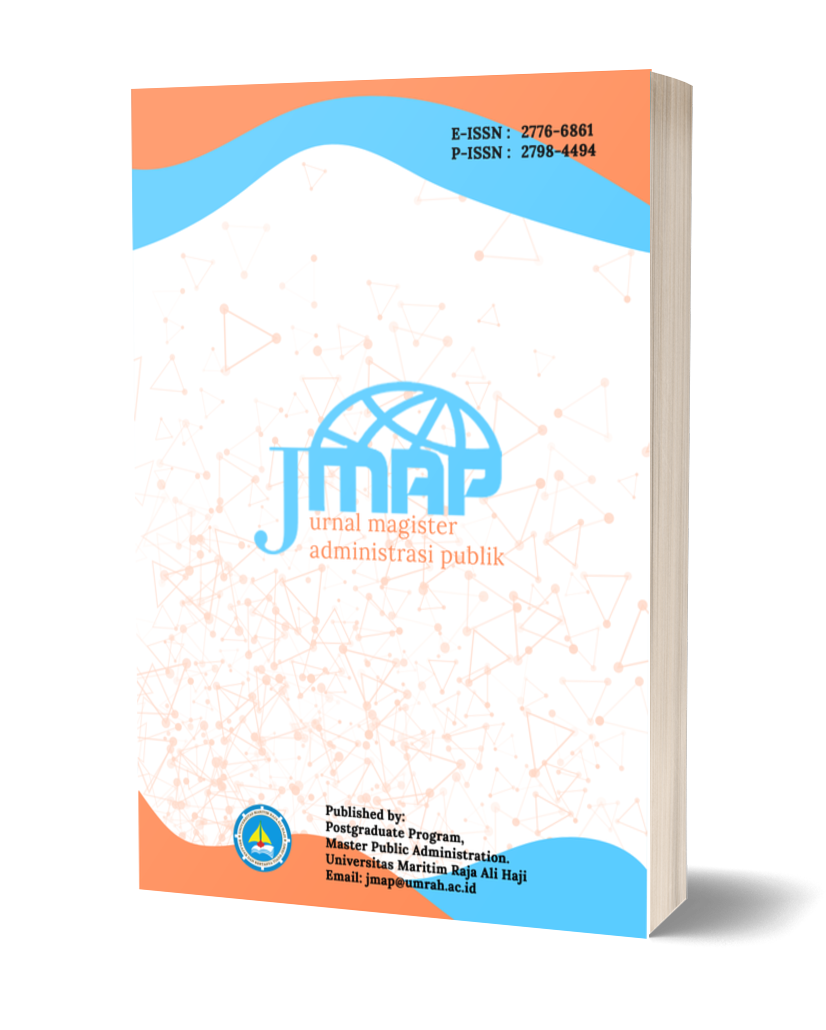The Role of Public Administration in Preventing Corruption of State Officials
DOI:
https://doi.org/10.31629/jmap.v1i1.3382Keywords:
Role, Public Administration, CorruptionAbstract
The main problem with the Indonesian government is the behavior of deviant acts of corruption that harm the nation and state. This research is shown to prevent acts of corruption by implementing the principles of public administration in state officials. The research method used, namely the type of quantitative research is comparative experimental. There are various policies taken by the government to prevent corrupt behavior, namely the application of the principles of public administration in state officials, ethical development and bureaucratic governance through the development of good governance, enforcement and application of public administration law, public awareness, and participation, efforts to improve the system. more effective and efficient public services, and the establishment of an independent institution to prevent corruption. However, this study found irregularities in the efforts to strengthen the KPK institution by re-doing the national insight test on employees.
Downloads
References
Adji, I. S. (2006). Korupsi, kebijakan aparatur negara, dan hukum pidana. Diadit Media.
Creswell, J. W., Hanson, W. E., Clark Plano, V. L., & Morales, A. (2007). Qualitative research designs: Selection and implementation. The counseling psychologist, 35(2), 236-264.
Diana, R. (2015). Sumber Daya Manusia Dan Produktivitas Kerja. Jurnal Istinbath XIV, (15). https://core.ac.uk/download/pdf/267946537.pdf
Fatkhuri, F. (2018). Korupsi dalam birokrasi dan strategi pencegahannya. Jurnal Ilmiah Manajemen Publik dan Kebijakan Sosial, 1(2), 65-76. https://doi.org/10.25139/jmnegara.v1i2.784
Fitria. (2012). Eksistensi Komisi Pemberantasan Korupsi (KPK) sebagai Lembaga Negara Penunjang dalam Sistem Ketatanegaraan Indonesia. Jurnal Nestor Magister Hukum, Vol. 2, No 2 (2012). Jakarta.
Joniarta, I. W. (2018). Banalitas Korupsi di Indonesia: Suatu Tinjauan Dari Perspektif Budaya. Jurnal Ilmiah Dinamika Sosial, 2(1), 142-159. https://doi.org/10.38043/jids.v2i1.358
Kartayasa, M. (2015). Korupsi & Pembuktian Terbalik: Dari Perspektif Kebijakan Legilasi dan Hak Asasi Manusia. Kencana.
Klitgaard, R. (2001). Membasmi Korupsi. Jakarta : Yayasan Obor Indonesia.
Kurniawan, T. (2011). Peranan Akuntabilitas Publik dan Partisipasi Masyarakat dalam Pemberantasan Korupsi di Pemerintahan. BISNIS & BIROKRASI: Jurnal Ilmu Administrasi dan Organisasi, 16(2). http://journal.ui.ac.id/index.php/jbb/article/viewArticle/612
Maryam, N. S. (2017). Mewujudkan good governance melalui pelayanan publik. JIPSI-Jurnal Ilmu Politik Dan Komunikasi UNIKOM, 6. https://repository.unikom.ac.id/51314/
Nuriyanto, N. (2015). Membangun Budaya Hukum Pelayanan Publik untuk Mewujudkan Kesejahteraan Rakyat. INTEGRITAS, 1(1), 15-36. http://eprints.uwp.ac.id/id/eprint/744/
Peraturan pemerintah No. 101 tahun 2000. Peraturan Pemerintah (PP) tentang Pendidikan Dan Pelatihan Jabatan Pegawai Negeri Sipil. LN. 2000 No. 198, TLN No. 4019, LL SETNEG : 12 HLM.
Satria, H. S. (2020). Kebijakan Kriminal Pencegahan Korupsi Pelayanan Publik. Integritas: Jurnal Antikorupsi, 6(2), 169-186. https://doi.org/10.32697/integritas.v6i2.660
Sinaga, O. (2007). Implementasi Sistem Administrasi Negara Indonesia dan Peranan Lembaga Negara dalam Membangun NKRI. Jurnal Administratur, 1(3).
Downloads
Published
Issue
Section
License
You are free to:
- Share — copy and redistribute the material in any medium or format for any purpose, even commercially.
- Adapt — remix, transform, and build upon the material for any purpose, even commercially.
- The licensor cannot revoke these freedoms as long as you follow the license terms.
Under the following terms:
- Attribution — You must give appropriate credit, provide a link to the license, and indicate if changes were made . You may do so in any reasonable manner, but not in any way that suggests the licensor endorses you or your use.
- ShareAlike — If you remix, transform, or build upon the material, you must distribute your contributions under the same license as the original.
- No additional restrictions — You may not apply legal terms or technological measures that legally restrict others from doing anything the license permits.

































